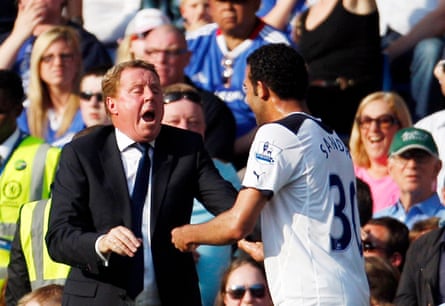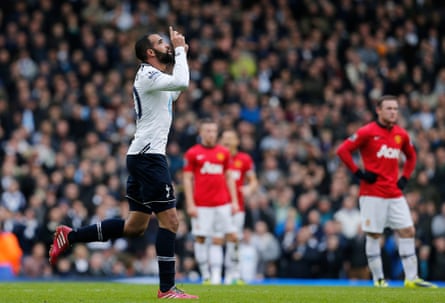After 10 years in Europe that took in seven clubs, a lot of ups and more than his fair share of downs, Sandro is back in Brazil. Still only 31, he has fuel left to burn. The coronavirus crisis has given him time to mull over his time on the other side of the Atlantic, bask in what was and ruminate on what might have been. Having spent lockdown at his parents’ farm – where he was busy looking after his young children, riding his horse and strumming his guitar – he is in a reflective mood.
Now back at his home in Goiânia, where he plays for Série A club Goiás, he describes Tottenham and English football in glowing terms, calling the club “sensational” and the Premier League “the best in the world”. He laughs as he recalls the good times under Harry Redknapp and André Villas-Boas. Yet there is discernible melancholy in his voice as he discusses the injuries – psychological blows as much as physical ones, he says – and the move to QPR, which he calls the “biggest regret” of his career.
In 2010, Sandro had just won the Copa Libertadores with Internacional and was already a full Brazil international. Daniel Levy, the Tottenham chairman, made a huge effort to sign him, flying to the south of Brazil twice to convince Internacional directors to accept a £10m offer. When Sandro arrived in London, he found a group of players who had qualified for the Champions League. “That team was sensational,” he says. It is an adjective he uses a lot to describe Spurs. “You had Bale, Modric, Van der Vaart. Aaron Lennon, Peter Crouch, Gallas, Gomes in goal. They were players who really made the difference.”
As a 21-year-old who spoke no English, he was not expected to excel immediately. But after a few months and a helping hand from Heurelho Gomes – a fellow Brazilian who he cites as a mentor – Sandro took off. “I was destroying it,” he remembers. “I scored against Chelsea and stood out in the Champions League.” His positive personality helped. “I’m a happy guy, spontaneous. Even without being able to speak English, I joked and laughed with everyone.”
Being thrown into the Premier League with a hands-off manager such as Redknapp could have come as a culture shock. Apparently not. “’Arry Redknapp”, Sandro says with a chuckle in his best cockney accent. “It was incredible working with him. Regardless of a player’s reputation, he would take them off at the start of the second half. He’d make the three substitutions early, change things if he saw the team was playing badly. He was a big character. At the start he’d talk to me: ‘Sandro, calm. Take your time. Get used to it.’ Then I started playing regularly. And he really loved me.”
The fondness is genuine and he laughs more as he recalls one of the first big Premier League games Redknapp he started, against Chelsea at Stamford Bridge. “He was talking a lot about his nephew. ‘Sandro, you have to be careful with Lampard, be careful with Lampard. You can’t push up too much.’ At one point I went forward, got the ball from Van de Vaart, controlled it and stuck in the angle – right in the top corner. Petr Cech is still looking for that one now. I went over to celebrate and [Redknapp] was having a go at me. He was telling me to get back, to defend, telling me to worry about Lampard. I was thinking: ‘Man, I scored. What is this guy talking about?’”

Spurs reached the Champions League quarter-finals in Sandro’s first season at the club, beating Milan in the last 16. It was his European debut, but Sandro was not overawed. He was singled out for praise by his manager after the first game at White Hart Lane and was man of the match at San Siro. “Those were the games where people really started to admire me. That was my moment.”
Roberto Mancini was suitably impressed and wanted to take him to Manchester. “It wasn’t just City. There were other clubs. But it was City that came in with an official offer. In the end, I stepped back. I have a really special affection for Tottenham and I didn’t want to lose what I’d built. I thought about having to go again, to earn my place.” Mancini’s side went on to win the league that season but Sandro does not feel as if he missed out. “I don’t regret not signing for City. In my heart, I am so happy for what I experienced with Tottenham. It was a privilege to have played there and to have had such a good relationship with the fans. I regret going to QPR much more, that’s for sure.”
Sandro left Spurs in the summer of 2014, when Mauricio Pochettino had just been appointed, and he rues it to this day. “That’s the biggest regret of my career, completely. I wish I could have played with Pochettino. He improved the players. He took Tottenham to another level. We take decisions in our lives that, if we knew what was going to happen, we wouldn’t take. I got it wrong. I got it wrong and I regret it.
“I could have gone to a Russian club for a lot of money and that made me open my eyes [to how much I could earn]. Then QPR [came in]. I went there because of [Redknapp], he made up my mind. But he left quickly. I injured my medial ligament, was out for three months and when I came back, he’d already been sacked, unfortunately. Then there was an issue with my visa. It was really bad for me psychologically. It was a real blow.”
By then, knee injuries had become something of a recurring theme. Those three months out at QPR were not even the lowest point in England. That came in January 2013 with his first ruptured ligament and the resulting reconstructive surgery.
He had won the Olympic silver medal with the Seleção at London 2012 and, upon his return to Spurs, had a “phenomenal” start to the season. “August 2012 until to January 2013. That period is my favourite memory [of England]. If I had managed to maintain that level…” He does not finish the sentence, but the implication is clear. “Then there was my injury. After that it fell away. That was the worst moment. After that I got a bit disheartened. It took a long time to come back.”

Still, he is content to recall the times he shared with those “sensational” teammates. “There was so, so much talent. I just ran around to the dirty work for those guys to play. Modric had incredible class. Sometimes you’d fire a duff pass into him, under pressure, and he’d transform it into a beautiful bit of play. Bale was lightning. He is [still] fast, but back then he was out of this world. I thought he was going to win a Ballon d’Or. He had everything. Harry Kane was just getting started. He was in the reserves. But I saw his transformation. He was a machine in training. I’m happy to have seen that. I give advice to the young attackers, I say: ‘Look at Harry Kane, one of the best forwards in the world.’ He sniffed out goals in training and was so dedicated.”
Sandro still follows Spurs from afar. Despite a difficult season for his old club, he is hopeful for what is to come. “Mourinho always wins. Even when he doesn’t deliver what is expected of him, which is the very, very top, he manages to win something. Like at United. He didn’t win the Champions League or Premier League, but they won the Europa League and League Cup. I believe that with him, Tottenham will win titles, building on the excellent work of Pochettino.”
While football has returned in much of Europe, uncertainty still reigns in Brazil, where coronavirus infections and deaths continue to rise at an alarming rate. Sandro is back in training with Goiás. “I feel safe because the doctors, directors and club president are doing great work. There are proper control measures. I don’t want to opine on whether the games should start now. The numbers need to start [to stabilise] to have games, to travel. If the logistics are safe, I would agree [to play]. If we are going to travel, maybe we’ll need a private jet for each club. The away trips are going to be difficult because of the transport.”
Whenever the time does come, Sandro will be ready. He has been free of injury for a year and is hoping to reach that irresistible peak he experienced in London. “There’ll be no lack of effort and dedication,” he says. “I want all this to pass so we can get back to playing and enjoying it.”

Comments (…)
Sign in or create your Guardian account to join the discussion